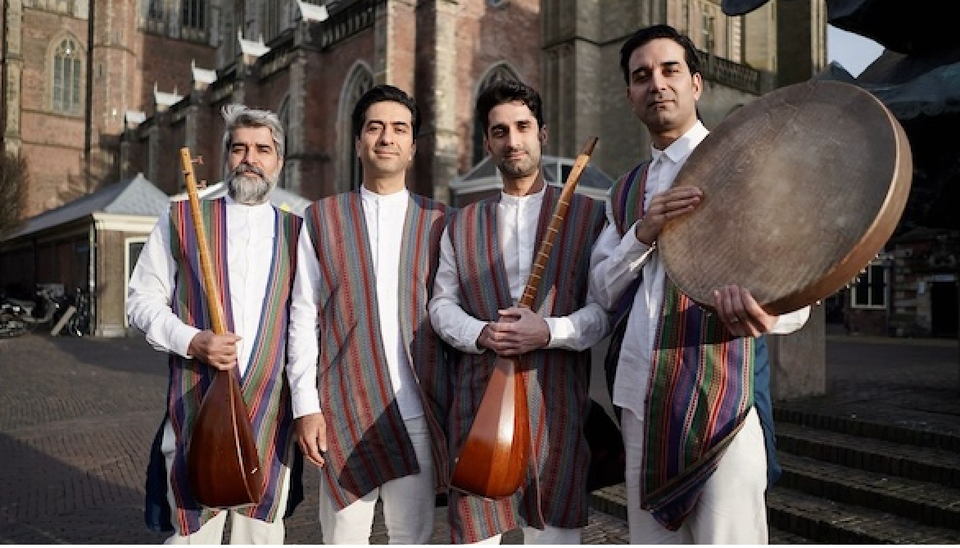8 November
World Music in the X: Hamdel Ensemble with Mohammad Motamedi

This evening there is a very special concert at De X, an ensemble with some of the biggest names in Iranian music.
Led by tanbour maestro and composer Seyed Ali Jaberi, the Hamdel Ensemble presents an enchanting musical journey deeply rooted in Persian Sufi and traditional music. The ensemble's members are not only virtuoso musicians but also experts in the Sufi tradition.
For this concert, they collaborate with Mohammad Motamedi, one of the great Iranian vocalists, who trained with master Mohammad-Reza Lotfi. Together, they tell a spiritual story using verses from Rumi's masterpiece, Masnavi-Manavi. A masnavi, a work of couplets, is a poetic genre in Persian and Arabic. They are typically long, didactic Sufi works written in continuous verse within a single meter.
Rumi's Masnavi is the longest and best-kn…
Led by tanbour maestro and composer Seyed Ali Jaberi, the Hamdel Ensemble presents an enchanting musical journey deeply rooted in Persian Sufi and traditional music. The ensemble's members are not only virtuoso musicians but also experts in the Sufi tradition.
For this concert, they collaborate with Mohammad Motamedi, one of the great Iranian vocalists, who trained with master Mohammad-Reza Lotfi. Together, they tell a spiritual story using verses from Rumi's masterpiece, Masnavi-Manavi. A masnavi, a work of couplets, is a poetic genre in Persian and Arabic. They are typically long, didactic Sufi works written in continuous verse within a single meter.
Rumi's Masnavi is the longest and best-known in this genre, containing over 25,000 couplets divided into six volumes. Popularly considered a storybook, they are, in fact, springboards to long passages from Rumi's mystical teachings. The main theme is the human journey toward union with God, the source of all existence. The price of this union is the sacrifice of the egoistic self.
Mohammad Motamedi has been singing and training since his youth, studying with great masters such as the late Hossein Omoumi and Aliasghar Shahzeidi. He has collaborated with the great maestros of Iranian music, such as Alexander Rahbari, Mohammad Reza Lotfi, and Hossein Alizadeh, and has performed in venues such as Carnegie Hall, Theatre de la Ville, and the Muziekgebouw in Amsterdam. He has been able to create his own original singing style and is therefore now considered one of the most distinctive and best singers in the genre.
Seyed Ali Jaberi is an award-winning master whose albums remain immensely popular among fans of traditional Persian and Sufi music. Mohammad Jaberi has been playing the daf and many other forms of percussion for 30 years. He learned to play the daf from masters Khalife Karim Safvati and Ahmad Khak Tinat. His distinctive playing style follows that of master Bijan Kamkar. Pouriya Jaberi began his musical education at the age of eight. He won first place at the Fajr International Music Festival in 2002 and 2005 at the age of 15. He also won first prize at the Western Iran Percussion Festival in 2008. He currently lives in the Netherlands.
Mitra Zolfi is a cellist and gheychak player. She works with the Khorshid National Instruments Orchestra (conducted by Majid Derakhshani) and the Iran Shahr National Orchestra, among others. She lives in Iran, teaches Persian classical music, and performs with various international ensembles.
Occupation:
Mohammad Motamedi – vocals
Seyed Ali Jaberi – tanbour (type of lute) and composition
Mohammad Jaberi – daf (frame drum)
Pouriya Jaberi – tanbour and percussion
Mitra Zolfi – gheychak (type of fiddle)
When
- Saturday the 8th of november 2025 from 20:30 to 23:00
Prices
- €25.00
